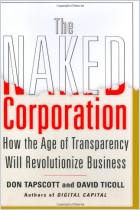
Tactical Transparency
How Leaders Can Leverage Social Media to Maximize Value and Build their Brand
Recommendation
Shel Holtz and John C. Havens have tremendous experience with a range of social media, and both this experience and their zest for its possibilities come through clearly. This lively, timely book’s core message is simple: In the digital age, transparency is a requirement, not a choice, and so business leaders must decide how to manage it. Your choices are complex, and fraught with emotion and risk. Transparency issues concerning openness and how much data to divulge often unfold in real time, so business readers need every bit of the guidance and preparation the authors provide. Holtz and Havens acknowledge that some of their specific suggestions will become dated quickly; however, their general principles and case studies will be useful for quite some time. (Actually, more pertinent than the fear that their pointers will become dated is the concern that the authors are overly enthusiastic about their topic.) getAbstract recommends this to readers interested in social media, and to leaders trying to shape a communication strategy in today’s shifting landscape.
Summary
About the Authors
Shel Holtz, author of Public Relations on the Net, is a principal of Holtz Communication + Technology. John C. Havens is lead organizer for PodCamp NYC and vice president of business development for BlogTalkRadio.













Comment on this summary